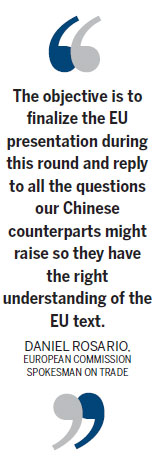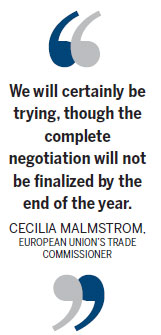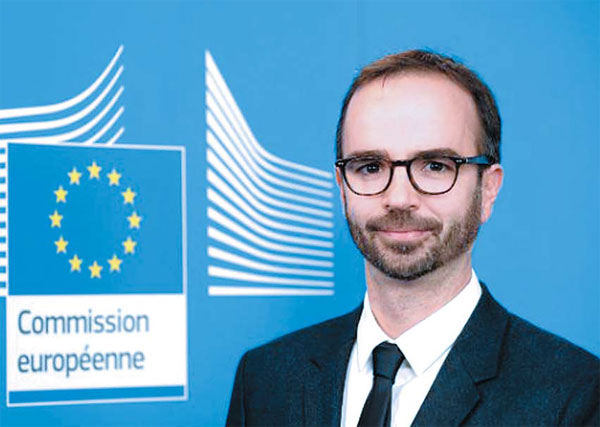On standby for trade pact discussions as investment treaty talks reach tough stage
Updated: 2015-03-20 07:34
By Liu Jia(China Daily Europe)
|
|||||||||||
China and its partners look forward to growth through pacts and reaties
The conclusion of a US-China bilateral investment treaty will "open up more new dimensions for the further growth of Sino-US ties", Chinese Premier Li Keqiang said at a news conference on March 15.
Negotiations on the treaty are making significant progress.
|
Daniel Rosario, European Commission spokesman on trade. Photos provided to China Daily |
|
Cecilia Malmstrom, European Union's Trade Commissioner. |
The two countries will bargain over the negative list - a list of things the treaty does not apply to - after 18 rounds of talks.
In a separate but related matter, the European Union's Trade Commissioner Cecilia Malmstrom says the pace of negotiations on the EU-China investment pact is "not fast". She made the comment as her chief negotiator prepared to leave for China for the fifth round of talks.
"It is not fast because there are difficulties," says Malmstrom.
"We have wanted a long-term goal, but the technical work is very important, the trust building too."

Her negotiation team, headed by Rupert Schlegelmilch, of the directorate-general for Trade at the European Commission, says the complex nature of the negotiations means they will be long.
But Daniel Rosario, the commission's spokesman on trade, says during the fifth round they will continue focusing on the presentation as well as a detailed explanation of the EU's proposal.
"The objective is to finalize the EU presentation during this round and reply to all the questions our Chinese counterparts might raise so they have the right understanding of the EU text," Rosario says.
He also emphasizes that the chief negotiators have committed to accelerate the pace of the negotiations this year.
"To this end, it is important to note that the forthcoming round is the second in the first three months of 2015.
"The EU is fully committed to these negotiations and is investing the necessary resources and energy.
"At the same time, however, this commitment to expeditious work cannot mean rushing into quick deals. Quality and a result bringing added value prevail over speed."
The new trade chief has been serious about agenda setting since taking office in November. But the investment treaty talks have been affected by the European Parliament elections in May and changes in EU leadership.
European stakeholders are pinning their hopes on the upcoming EU-China Summit in Brussels in June, at which Li is expected to set an even more optimistic tone for the Sino-EU investment talks.
"This year's celebrations of the 40th anniversary of EU-China relations can be an additional push for investment talks," says Arnaldo Abruzzini, secretary-general of Eurochambres, expressing the wish of many European businesses.
They say strong political commitment is vital in any trade deal, and the investment agreement with China is no exception.
"We will certainly be trying, though the complete negotiation will not be finalized by the end of the year," Malmstrom says.
She says she cannot be specific about when there will be the breakthrough that business has long hoped for.
"But generally speaking, when there is a meeting like this, if they want to deliver something, a strong political will could speed up the negotiation process."

Angela Merkel, who heads the EU's largest economy, said in the opening speech at CeBIT, the high-tech fair in Hanover, that German business values China not just as its most important trade partner outside Europe but also as a partner in developing sophisticated technologies.
Nearly a year ago, Chinese President Xi Jinping called for open talks on a comprehensive EU-China free trade agreement during his visit to EU headquarters.
Chinese and European think tanks are now looking for a red-letter day on which a feasibility study on a EU-China free trade agreement can be initiated.
At the moment, besides the talks with China, the EU, which just concluded a comprehensive free trade agreement with Singapore, is busy with other ambitious negotiations including the Transatlantic Trade and Investment Partnership with the US and trade agreements with countries including Canada and Japan.
China is active in knitting its own global free trade agreement network too, in addition to establishing treaties with the US and EU. The latest achievements include the implementation of deals with Switzerland, Iceland, as well as the to-be-signed Sino-South Korea and Sino-Australia deals this year.
European Parliament President Martin Schulz said before his visit to China this year, that a successful conclusion of the investment negotiations, resulting in an agreement that provides real new market access opportunities for European business, will send a strong signal that Europe is ready to look at broader ambitions.
Consequently, the investment treaty talks may also serve as a precursor to an even more ambitious blueprint: the bilateral free trade agreement.
For China Daily
(China Daily European Weekly 03/20/2015 page8)
Today's Top News
Manhunt launched for accomplices in Tunisian museum attack
Chanel to reduce prices in China
Russian FM slams Kiev for turning Minsk agreements 'upside down'
European chamber calls on China to boost reforms
Chinese firm takes stake in French airport
Putin slams attempts to rewrite WWII history
EU police group launches team to tackle migrant smugglers
Britain needs oil tax cuts to attract North Sea investment
Hot Topics
Lunar probe , China growth forecasts, Emission rules get tougher, China seen through 'colored lens', International board,
Editor's Picks

|

|

|

|

|

|







